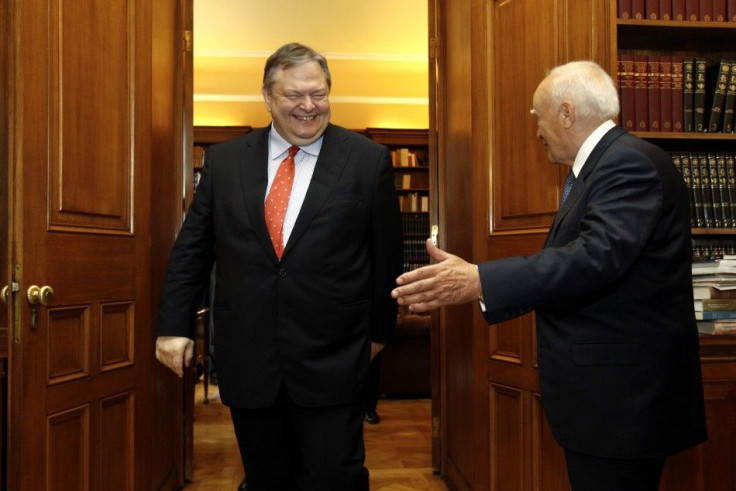Greece: Now It?s PASOK?s Turn To Form Unity Government As Fears of Euro Exit Intensify

After the failure of two previous parties to form a coalition government in Greece, the Socialist PASOK party led by Evangelos Venizelos, will now take a crack at it.
Venizelos, whose party finished a distance third in Greece’s parliamentary elections from last weekend with only 13.7 percent of the vote, nonetheless received the mandate to form a unity government following the inability of Antonis Samaras of the conservative New Democracy (ND) party and Alexis Tsipras of the left-wing Syriza party to find a compromise solution to the political crisis.
Venizelos, the former finance minister, said he will “explore all possibilities” in his quest to create an alliance with rival parties, including ND, Syriza and the Democratic Left.
Together Pasok, ND, Syriza and the Democratic Left accounted for almost three-fourths of parliamentary seats, however it is doubtful these four parties can find a common consensus.
“Things are not easy and I am not saying I am optimistic but I am determined to serve the national interest,” Venizelos said.
He also told AP: It [is] clear that in the current stage of this process we cannot reach a solution but that we must continue this effort. So the mandate… will have substance and importance.
Tsipras, whose left-wing umbrella group scored a surprising second place finish in the election and who strictly opposes Greece’s bailouts and austerity program, had told the President he had “exhausted every possibility and scope for creating a government compatible with the popular mandate.”
The Syriza leader told his party’s MPs: We cannot make true our dream of a left-wing government.
Samaras warned fellow ND officials that Tsipras’ rejection of the bailout deal will lead to immediate internal collapse and international bankruptcy, with the inevitable exit from Europe.
He added: [Amending] the loan deal is one thing, it is a completely different thing to unilaterally denounce it. The second option leads to catastrophe that is certain and immediate.”
Indeed, in the event that Venizelos is unable to form a unity government (an almost guaranteed certainty given the current political atmosphere in Greece and the Pasok party’s widespread unpopularity), new elections may be necessary and would be held in the middle of June.
Greece is facing other urgent issues with respect to its huge financial crises.
On Wednesday, the euro zone's rescue fund chose to withhold €1 billion of its latest tranche of bailout money for Greece, subject to a decision by euro zone finance ministers at a meeting scheduled Monday. However, the fund said it would distribute the €4.2 billion euros of the €5.2 billion euros due to Athens on Thursday.
The European Union and Germany have repeatedly urged Greece to maintain austerity and meet its stringent financial obligations under the bailout agreements.
Germany would like to keep Greece in the euro zone, but Greece's fate is now in its own hands, warned German Foreign Minister Guido Westerwelle on Wednesday:
Indeed, if Greek political parties fail to come to some kind of compromise, the country may be unable or unwilling to abide by the terms of the two EU/IMF loans. In exchange for a total of €240 billion euros ($312 billion) in rescue funds, Athens had agreed to a painful program of job cuts, spending reductions, tax hikes and salary/pension freezes.
Of greater urgency, Athens needs to find another €11.5 billion euros ($14.3 billion) of cuts next month, or the government may default on the bailout loans, leading to a possible exit from the euro zone.
Fears are growing that Greece will indeed exit the euro, regardless of how the political dramas in Athens play out.
Bloomberg reported that more than half of investors and traders it surveyed are predicting that Greece will depart the euro sometime this year. They are also fearful that Spain (a much larger economy than Greece) may default.
A report in the Wall Street Journal warned: “two years after Europe bailed Greece out to protect the euro, the rescue has become a debacle that threatens to unravel the common currency…. Greece's growing turmoil is the culmination of a radical austerity experiment and botched economic overhaul that have pushed the nation to the brink ... The story of the ill-fated bailout suggests that forcing deep austerity on individual member states won't save the euro and may worsen its crisis.”
© Copyright IBTimes 2024. All rights reserved.











